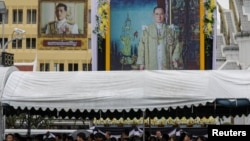Set amidst the depth of Thailand's monsoon rainy season, more than a quarter of a million mourners are set to attend this week's royal cremation of the country's late and revered king, Bhumibol Adulyadej.
King Bhumibol, 88, who died in October last year, has laid in a state with almost 13 million mourners, often queuing for hours, paying their final respects to a monarch who reigned for 70 years.
In 2006 the world's royalty celebrated Bhumipol's 60th anniversary of royal accession. Now they come to mourn him. The ornate ceremonies, overseen by his son and heir, King Maha Vajiralongkorn, are being joined by kings and royalty from more than a dozen countries, including Britain, Japan, Bhutan, Lesotho, Sweden, and the Netherlands.
International dignitaries from Asia, Europe, Africa and Australia are also attending. The United States, where Bhumibol was born in 1927, in Cambridge, Massachusetts, will be represented by Secretary of Defense James Mattis.
Gavan Butler, a political economist from Sydney University and past lecturer in Thailand, said King Bhumipol continues to be held in great affection across the generations.
"I hear young people in their 20's and 30's still talking about Bhumipol as 'my king' - a great affection - leave aside how that affection came to be constituted - but it's there. They do talk about 'my king' and they will be profoundly sad on the occasion of the cremation," Butler said.
The royal pavilions, known as the Phra Meru Mas, built by Thai artisans at a cost of $90 million, stands over 50 meters high, with its edifice on a three-tiered square base, each side 60 meters length.
Ornate and elaborate, reflecting Hindu and Buddhist religious themes, the royal pavilion throne tapers up from the base into a highly decorated tiered roof topped by a spire.
The main pavilion will house the catafalque for enshrining the royal urn made of sandalwood.
The ceremonies
The formal ceremonies commence October 25, with the royal urn being transported to the Royal Crematorium. The final cremation ceremonies take place in the afternoon and evening of the following day with events continuing until October 29.
The week-long ceremonies have cast a long shadow over the country, with October 26 declared an official holiday, with shopping centers, cinemas, entertainment venues, the financial markets and other institutions all closed.
The ceremonies are taking place amid tight security, with over 50,000 police and volunteers on hand. Replicas of the royal crematorium are also in place in the more than 70 provinces in Thailand.
Carl Thayer, a political scientist at Australia's University of New South Wales, said King Bhumibol played a central role in Thailand's social and cultural landscape.
"From a young man raised in part in the United States to the King of Thailand and what [analyst] Duncan McCargo calls the 'center of the network monarchy' where his moral and political authority was accepted by all the major actors in Thailand and in a sense he could exercise veto power over time," Thayer said.
But analysts say King Vajiralongkorn faces major challenges to gain the degree of respect accorded to his late father, who held enormous prestige among the Thai people.
Thailand has been under a military-led government since a coup in early 2014, which analysts say was aimed at overseeing a smooth transition in the royal succession.
Thitinan Pongsudhirak, a political scientist at Chulalongkorn University, in a recent commentary, said the past symbiotic relationship between the military, monarchy, and bureaucracy, is less secure with the passing of King Bhumipol.
"What many Thais are waiting to see is how the new monarchy, King Maha Vajiralongkorn intends to reign," Thitinan said. "The relationship between the new king and the [military] junta is thus crucial to understanding how Thailand's new politics will unfold," he said.
The Thai monarchy's strength faces challenges and uncertainties as Thailand moves beyond the mourning period, said Martin Stuart Fox, a political scientist at Queensland University.
"[Bhumipol] was the longest-serving monarch in Thai history. Therefore given the Buddhist world view endowed with some very good karma, the significance of this as a transition would lie in the shift from this stable monarchy under Bhumipol, despite all the military coups and so on, to a much more unstable and unpredictable future for Thailand," he said.







